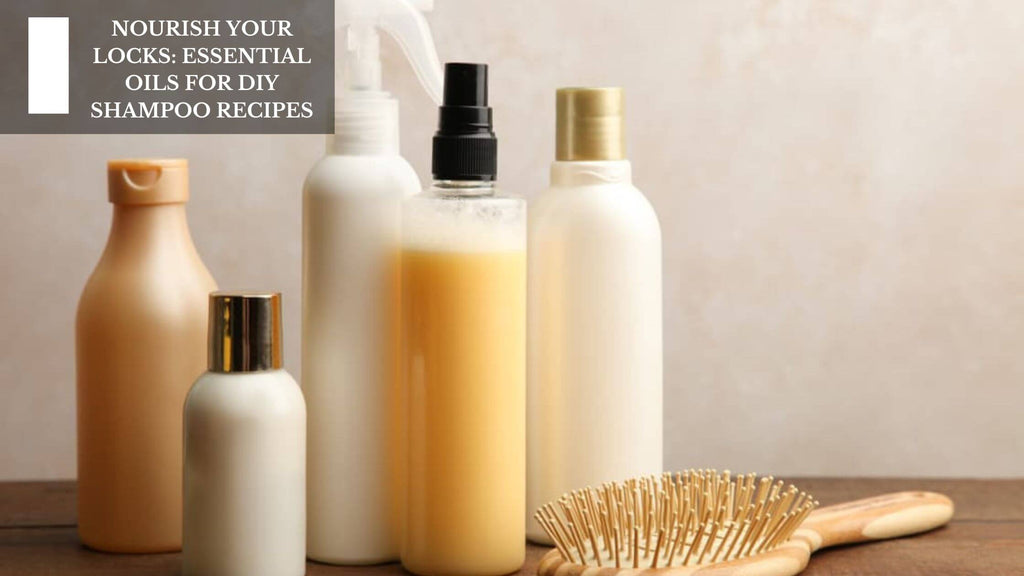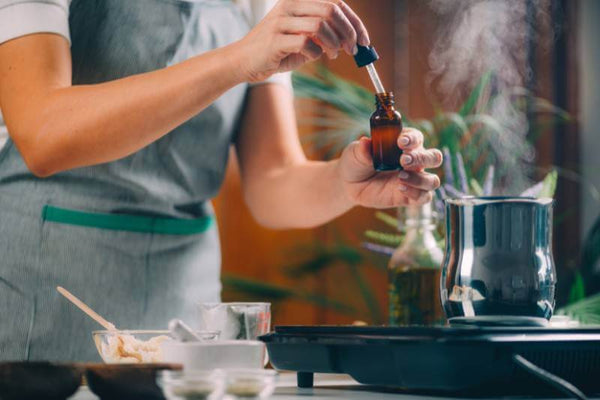Nourish Your Locks: Essential Oils For DIY Shampoo Recipes

Haircare is an essential part of our daily routine, and using the right products can make all the difference. However, many commercial hair products contain harsh chemicals that can damage hair over time. That's where DIY haircare comes in. Not only are these oils great for your hair, but they are also natural and safe to use. Each oil has unique properties that can improve your hair's texture, shine, and overall health. These potent plant extracts can help nourish the scalp, promote hair growth, strengthen hair strands, and add a natural shine to your locks. Lavender essential oil is renowned for its calming scent and has antimicrobial properties that can help soothe the scalp and reduce dandruff. Peppermint essential oil provides a cooling sensation and can stimulate hair follicles to promote hair growth.
You may also like:
Tea tree oil is a powerful antiseptic that can help treat scalp conditions like dandruff and dermatitis. Rosemary essential oil is a popular choice for improving circulation to the scalp, which in turn promotes hair growth and helps prevent hair loss. Lemon essential oil is known for its cleansing properties and can help reduce excess oil production on the scalp. Chamomile essential oil is gentle and soothing, making it ideal for sensitive scalps and adding a natural shine to hair. By incorporating these essential oils into your DIY shampoo, you can create a personalized hair care product that not only cleanses your hair but also nourishes and revitalizes it from root to tip. The benefits of using essential oils in hair care are endless, making them a must-have ingredient for anyone looking to achieve healthy, luscious locks.
Best essential oils for shampoo
1. Lavender essential oil
Known for its calming scent, lavender essential oil can help promote relaxation while also providing nourishment to your hair and scalp.
2. Rosemary essential oil
This stimulating essential oil is excellent for promoting hair growth and enhancing circulation to the scalp, making it a popular choice for those looking to improve hair thickness and health.
3. Peppermint essential oil
With its cooling and refreshing properties, peppermint essential oil can invigorate the scalp and leave your hair feeling revitalized and clean.
4. Tea tree essential oil
Renowned for its antimicrobial properties, tea tree essential oil can help combat dandruff and soothe irritated scalp conditions, making it a go-to choice for those with sensitive scalps.
5. Cedarwood essential oil
This earthy and grounding essential oil is beneficial for promoting a healthy scalp environment and can help balance oil production, making it suitable for all hair types.
6. Chamomile essential oil
Known for its soothing properties, chamomile essential oil can help calm inflammation and irritation on the scalp, making it a gentle yet effective choice for those with sensitive skin.
Step-by-step guide to making your DIY shampoo

1. Start by selecting a base shampoo: Choose a gentle, sulfate-free shampoo as the foundation for your DIY creation. Look for a formula that is free from harsh chemicals and fragrances to ensure a clean and natural base for your essential oils.
2. Gather your essential oils: Select essential oils that are known for their beneficial properties for hair care. Consider oils such as lavender for its calming effects, rosemary for stimulating hair growth, and tea tree for its antibacterial properties. Mix and match oils to create a blend that suits your hair type and desired results.
3. Measure and mix the essential oils: Using a dropper, carefully measure out the desired amount of each essential oil into a clean glass bottle. Be mindful of the potency of each oil and adjust the quantities accordingly to create a balanced blend.
4. Add the essential oil blend to the base shampoo: Once you have combined your selected essential oils, gently pour the blend into the base shampoo. Use a funnel to ensure a precise transfer and avoid any spills or waste.
You may also like:
5. Shake well to mix: Secure the cap on the shampoo bottle and shake well to thoroughly mix the essential oils with the shampoo base. The shaking action will help distribute the oils evenly throughout the shampoo for maximum effectiveness.
FAQs
1) What shampoo mix should you use for dry hair?
If you have dry hair, consider adding moisturizing carrier oils such as argan oil, coconut oil, or avocado oil to your shampoo blend. These oils can help hydrate and nourish your hair, leaving it soft and manageable. To repair and restore damaged hair, consider incorporating essential oils like rosehip oil, geranium oil, or cedarwood oil into your shampoo blend. These oils are known for their rejuvenating properties and can help improve the overall health of your hair.
2) What shampoo mix should you use for oily hair?
For oily hair types, opt for essential oils with astringent properties like tea tree oil, peppermint oil, or lemon oil. These oils can help regulate oil production on the scalp and promote a balanced, healthy scalp environment. If you have fine hair, lighter oils like jojoba oil or grapeseed oil can help add moisture without weighing down your strands. Additionally, essential oils like rosemary or lavender can help promote hair growth and strengthen hair follicles.


Leave a comment